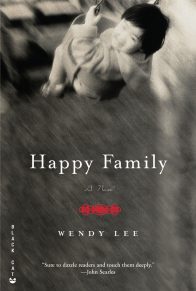There was chaos.
Will someone please explain why we are here? – What are we going to eat? Who has thought of that? – Who is in charge here? Let me speak to him!
A 747 had disgorged its 323 passengers into the middle of a vacant, snow-brushed tarmac expanse, left them to trudge across it through the cold and the floodlit glare to a terminus whose neon name was only illuminated in patches and anyway was in a language most of them could not read; had abandoned them, in short, in the Middle of Nowhere, in a place that was Free of Duty but also, much more importantly, devoid of any obvious egress, like a back corridor between two worlds, two somewheres, where people only alighted when something was seriously kaput with the normal eschatological machinery.
Do you realize I have a vital meeting tomorrow morning? I haven’t got time to be here!
Sir: we have already explained it to you several times.
This snowstorm breaks all of Tokyo’s records. The city is blanketed, completely inaccessible. Do you understand? Absolutely no possibility of landing there. Everywhere in this hemisphere planes are lurching as we speak, U-turning, overnighting where they can. We cannot argue with the weather. These things happen.
Three hundred and twenty-three people clamoured for a hearing for their unique Woes. My husband is waiting for me at the airport. I’m only going to get one honeymoon. I have to be back in New York on Friday: my vacation is Over. Over. This cannot be happening. Heads in hands, bloodshot eyes towards heaven.
A queue formed, of sorts, at the one open desk where a man tried to hold off the snaking, spitting vitriol long enough to find a solution. We understand Madam it’s very late yes the little one looks quite unhappy please bear with us.
People checked for passports, money. Do Americans need a visa to be here? – What are the hotels like? Where can we sleep? –
What is the problem here?
The man stood on his chair. Hands raised to beat down the voices, you had to give it to him he wasn’t going to let himself get intimidated, Can you please listen?
I don’t know if any of you has read the newspapers recently but if you have you will know you’ve just landed up in the wrong place at the wrong time – latecomers to the world fair, no room at the inn. Everyone is in town right now and there isn’t a hotel room in the entire city. Well what were you expecting? Every world leader is here and ten thousand journalists and forty thousand demonstrators. Don’t you people watch the news? We’ve had water cannon and barbed wire and rubber bullets and all kinds of other frolics. In our streets! What I Am Trying To Say ladies and gentlemen is that the city is full to overflowing, getting proper accommodation is going to be a problem for you and there’s no point getting hysterical about it. We should be able to get you on a flight in the morning – the worst possible scenario is that you have to spend a few hours here and that, I am confident enough, is not going to kill you – but don’t worry, calm down! we are going to do our best to make sure it doesn’t happen.
The crowd detested him already and as he abused them in this manner a wave of foul language gushed from their several mouths, shivered and swelled and crashed over him full of lonely feelings and terrible thoughts. He was undeterred:
I would like you all to know that my wife is a travel agent and I have already informed her you are here and that you’d all like a place to stay for the night. She’s at home as we speak calling round all the hotels for you and trying to sort you out. We’ll do it first-come, first-served and we’ll try to get you in bed as soon as possible.
The place felt like an emergency ward. Captions on the departure board rustled frantically – TOKYO CANCELLED TOKYO CANCELLED TOKYO CANCELLED – and the packed baggage carousel squeaked like an anxious heartbeat monitor under the weight of hundreds of suitcases it had not been expecting.
You don’t understand. I need to get out of here right now. I was never supposed to be here. I’m presenting at a conference in eight hours.
No – excuse me all of you – excuse me! – sorry sir you’d better make your phone calls now. I don’t think it’s likely you’ll be anywhere but here in eight hours. Can you all try and remain calm please! Thank you!
Somebody made the discovery that mobile phones worked. Even here! The tumult diminuendoed into urgent private consultations and intimate reassurances: No I may not be there tonight, they’re telling us tomorrow now, Of course I’m safe no this place stinks but the people look OK. Yes tomorrow I promise I think you ought to warn Bob that he may be doing the presentation – yes get him out of bed for God’s sake! – the file is on my computer. My Documents. I love you too. Sir would you mind if I made a really quick call from your phone? It’s just that it’s really important.
OK good news ladies and gentlemen! We have ten double rooms in a hotel downtown. Yes Madam I think that’s a good idea there’s no point your little one staying up please go this way. Three star. Nine more people please! Sorry that’s the best we can do for now. We will call you all in the morning. By 8 a.m.
People filed out into the cold, foreign night, got into a minivan, were gone. “At least he looks as if he’s in control” spread between people, maybe it’s best to just wait like he says. Wry smiles passed between strangers sharing their Why does it always happen to me!
If the company had sent me here I’d be in the Hilton . . .
It only happened when it was absolutely crucial that everything go smoothly, on the one day: that constant small-minded cattiness of the cosmos, the incompetence of people with insufficient awareness of the importance of Things who are unfortunately indispensable in the system, you have no choice but to depend on so many people who don’t know and don’t care.
We’ve just found a hotel out of town that can take eighty of you! This way! Quickly. Thank you. Fifty. You’re together? Seventy. Seventy-eight. Thank you. No I’m sorry Sir they told us strictly no more you’ll have to wait for the next place.
The crowd diminished slowly, the noise separated out from its hubbub into discrete conversations and exclamations. Ruminations. People were Taking Stock. Tokyo tomorrow night that means I miss the connection the next one is Thursday which means I have to spend a couple of days there God I’ve always wanted to see Tokyo! The snowstorm was like a wall across a highway that brought cruise control to a whiplash standstill: but as you thought about it there were ways around it, through it even, and the other possibilities started to seem more, well, felt. Fists and tempers were still shaken at the blatant injustice of it all, but around the airport hall the mutant seed of force majeure was already sprouting up through the edifices of cherished Plans, cracking the walls and floors until they crumbled in a cloud of dust which, as it cleared, revealed something new. Well anyway what can you do? – I think the insurance covered this. – We’ve just got to see what time we get out of here in the morning.
Buses and taxis bustled outside, headlights clipping the snow, and the man on the desk, phone cocked between shoulder and ear, hands busy on the keyboard, produced regular triumphant announcements: guesthouses and bed-and-breakfasts and undocumented hotels that the global visitors had missed. It was late: lights went off in the Duty Free stores and the snack bar closed. Someone summarily extinguished CNN’s airport news service, and grandiose light boxes advertising American Express and The Economist flickered, and became dull. Middle-aged women with headscarves and mops started to trace epic shiny corridors from one end of the floor to the other, shaking themselves free of detritus – plastic cups, newspapers, baggage tags – each time they turned around. An assortment of almost unnoticeable people – who were those people? – settled down in various shadowy corners to sleep on vinyl chairs.
Thirteen people were left, muted by fatigue, able only to stand and try to follow the curlicue meanderings of the phone conversation that contained their future. Full too? OK. And no dice with the Sunshine Hotel. Yes, I remember. What other options do we have? Really. Yes I know what time it is. No I think you’re right. You’re sure there’s nothing else? OK. Thank you so much. Thank you. I’ll see you later. He put down the phone slowly, tenderly.
Ladies and gentlemen I apologize for the time you’ve had to wait here, you’ve been very patient. Now I’m afraid that there doesn’t seem to be a single place left for you people to stay. We really have tried everywhere but as I said to you earlier it’s not a good time to be looking right now. I haven’t got anything left to suggest. I’d invite you all to spend the night at my place but unfortunately my wife and I have only a one-room apartment and I’m not sure that you’d be very comfortable there. So I think that – I’m really sorry about this – you’re going to just have to do the best you can right here. Now the good news is – I’ve just got the schedule confirmed – your flight is leaving at 09.55. The snowstorm has already subsided in Tokyo. Check-in time is 7.30. So it’s really just a few hours. I’m really sorry.
It wasn’t his fault. No point making a fuss. This place was depressing and dead but what could you do? He’d tried his best. Just a few hours, as he said. He picked up his jacket and left. Good night. Good night. Night.
The baggage carousels were still and silent, and in the half-light there stood security people with guns and military uniforms. The great windows of the building revealed nothing but blackened copies of the hall where they stood, with a huddle of thirteen in each one. They felt an inexplicable need to stay close, as if during the reconstitution of themselves around this new Situation a sort of kinship had emerged. They moved towards the chairs like atoms in a molecule, no closer but also no further away than their relationship dictated.
They sat. Wearied smiles were exchanged. An American woman spoke. I’m going to see what the little girls’ room has to offer. Another woman joined her. Everyone faced each other on rows of chairs, three sides of a square. – I was supposed to be on my way to Sydney by now. My brother’s wedding. Maybe I’ll still make it. – Everyone had a story.
(One man watched in fascination as, in the distance, an astounding, prehistoric kind of thing, a land mollusc, a half-evolved arthropod, all claws and wing cases, limped slowly from one side of the hall to the other. An insect, surely, but from here it looked the size of a rat. No one else seemed to notice.)
The two women returned with water bottles and packets of snack food. The guards got us these. It’s something, anyway. Toilets are OK if anyone was wondering. You know this is the first night I have spent away from my wife in fifteen years of marriage. Can you imagine? (A Japanese man with his tie loosened.) Every night for fifteen years I have slept next to her. It feels strange to think of her lying alone on one side of the bed right now. Lop-sided. If she only knew I am spending the night with so many new friends – and so many pretty ladies! – boy what would she think! Oh-boy-oh-boy-oh-boy! The first night I ever spend away and here I am staying up through the whole night! This is wild.
I haven’t done this for years.
There was little to say, but an undeniable warmth. People passed round peanuts. A large middle-aged man with remarkable crevasses across his face accepted the last cigarette of the backpacker girl next to him and they smoked slowly, occasionally dropping ash into the empty Marlboro box she cupped in her hand. No one spoke. The guards dozed with rifles sticking up between their legs.
You know friends I don’t think we know each other well enough to sit in silence. Have to go through a lot before you can do that. But we shouldn’t ignore each other. Don’t you agree? Let me make a humble suggestion – maybe you don’t agree – but I was thinking just wondering to myself: Does anyone know any stories?
When I was a student we used to tell stories in the evenings. No money for anything else! I’d love to hear some stories again. It calms you down, you think of other worlds. And before long we’ll all be ready to check in for our flight. What do you say?
I don’t know any stories. I’m not very good at that kind of thing.
But everyone felt it was good there was talking.
Look sir you’re not going to tell me that! Everyone knows stories! I just told you I slept in the same bed as my wife every night for the last fifteen years in the same bedroom of the same flat in the same suburb of Tokyo – and look at all you different people! You just have to tell me how you travel to work every morning in the place where you live and for me it’s a fable! it’s a legend! Sorry I am tired and a little stressed and this is not how I usually talk but I think when you are together like this then stories are what is required.
Someone spoke: I have a story I can tell.
Simple, just like that.
©2005 by Rana Dasgupta. Reprinted with permission from Grove Atlantic, Inc. All rights reserved.















